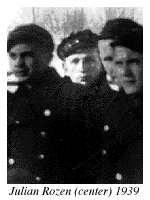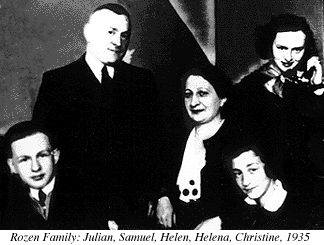CHRISTINE DAMSKI TELLS HER STORY (Continued)
CHRISTINE DAMSKI: Julian and I stayed in Lvov until the Germans returned in 1941. We were coming home from a concert the night of June 22, when all of a sudden we heard bombs explode; we knew that the terrible
war had started again.
For more than two weeks the Germans bombarded Lvov in a ferocious battle. Lvov was a Ukrainian city, and many Ukrainians hated the Polish people. While the Russians were in charge, the Ukrainians pretended to be friendly, but they hated the Russians as much as the Poles. When the war started again, they massacred Poles, and Jews too, because quite a few Jews worked for the Russians. The Ukrainians turned to the Germans as friends.
Julian and I were in a terrible situation in Lvov. There was still a recognized border between the Soviet and German territory.
 My father sent word that he was sending someone to bring us back; in September the brother of my best girlfriend from school arrived with a car. My father paid him a lot of money to do this--he had known him since he was a very young boy, and trusted him. He took Julian first, then two weeks later returned for me.
My father sent word that he was sending someone to bring us back; in September the brother of my best girlfriend from school arrived with a car. My father paid him a lot of money to do this--he had known him since he was a very young boy, and trusted him. He took Julian first, then two weeks later returned for me.
We still had big problems. The Germans considered every Jew returning from Lvov to be a Communist. When my cousin's father brought my cousin back from Russian territory the Germans executed both of them for supposedly being Communists. Julian and I had to hide.
We went to our relatives' estate at Siedliska, a little village near Lublin where they had a big house and farm land. All the peasants around there once worked for them. When the Germans came, my relatives had to move out of their house to one of the outer buildings, something like a stable. But the peasants were very friendly; one of them gave up his little hut to Julian and me and three of our friends who were in a similar situation. Of course, we paid him well.
The five of us lived there for a month. None of us had false papers yet. One day a Gestapo car pulled up to the house. I wasn't alarmed; I thought that probably my father had sent for Julian. Our father still had his brewery, and we were used to a lot of S.S. and military men coming to buy beer.
There was only one entrance to our hut. The Gestapo never knocked; they pushed the door, and barged in. We were sitting at the table--Julian and I, and our three friends.
"Which one is Julian Rozen?" they asked.
Slowly, my brother stood up. They put handcuffs on him, and took him away.
My heart stopped. I couldn't think. There was no telephone; I couldn't communicate with my parents. Early the next morning I walked seven kilometers to the railroad station. Only one car at the end of the train was allowed for the Poles, and you had to give a bribe for a ticket. I got a ticket for Zamosc, and went straight to my parents' home.
 It was a very tense situation. I found out that the man my father had hired to bring Julian and me safely back across the border--my girlfriend's brother--had betrayed us to the Gestapo. He told them that my father had brought us back illegally, and that Julian was in hiding. They arrested my father and tortured him so terribly, he broke down and told them where Julian was. I know just how badly they treated my father because a few days later I saw him myself.
It was a very tense situation. I found out that the man my father had hired to bring Julian and me safely back across the border--my girlfriend's brother--had betrayed us to the Gestapo. He told them that my father had brought us back illegally, and that Julian was in hiding. They arrested my father and tortured him so terribly, he broke down and told them where Julian was. I know just how badly they treated my father because a few days later I saw him myself.
My sister Helena and I were talking in the kitchen. I was wearing a fur coat, without an armband; at that time Jews no longer had fur coats--the Germans had taken them all away. My mother had gone out, to find money for bribes to release my father and brother. Suddenly, the door was pushed in, and there was the Gestapo--two big tall guys--and behind them, my father, all beaten up: a big gash in his temple, no teeth, his nose smashed in.
My father looked straight at me. "What is this Polish girl doing here?" he said. "She doesn't belong here. Make her leave!"
They didn't ask me anything. "You! Out!" I flew out. He saved my life.
The next day my sister told me that they had thought she was me. They even went through all the picture albums to find out what we looked like. My father just kept telling them she was not the one they were looking for, and finally they believed him.
A few days later they let my father out of jail, for a big bribe, but not my brother. Julian was sent to the Polish prison in Zamosc. Not realizing he was Jewish, the prison authorities put him in a cell with Poles. Then they transferred him to Zamek, the biggest prison in Lublin.
I stopped speaking to my father. I couldn't believe he would tell the Gestapo the whereabouts of his only son. It was hard to forgive him.
Return to:
 My father sent word that he was sending someone to bring us back; in September the brother of my best girlfriend from school arrived with a car. My father paid him a lot of money to do this--he had known him since he was a very young boy, and trusted him. He took Julian first, then two weeks later returned for me.
My father sent word that he was sending someone to bring us back; in September the brother of my best girlfriend from school arrived with a car. My father paid him a lot of money to do this--he had known him since he was a very young boy, and trusted him. He took Julian first, then two weeks later returned for me.
